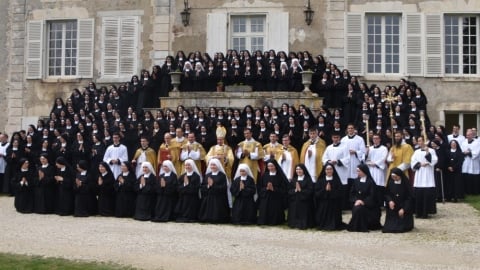Moral ecumenism: bitter fruit of Vatican II

Is Cardinal Kasper's notion of moral ecumenism completely illogical? Or is this an inevitable consequence of Vatican II's modernist ecumenism?
Image above: Gustave Dore's representation of Moses casting down the Ten Commandments before a disobedient Israel.
If doctrinal ecumenism—which relativizes truth—is acceptable, it logically follows that morals—which rest upon the bedrock of theology—must also be "ecumenical" and so open to interpretation. Thus we have arrived at the logic of Cardinal Kasper's "pastoral solution" on the issue of marriage and Communion for divorcees.
As the conclusion of this commentary makes clear, this revolutionary concept of "moral ecumenism" is simply another bitter fruit of the modernist errors of Vatican II.
Is Cardinal Kasper the catalyst of a moral revolution?
In recent interviews, German Cardinal Walter Kasper suggested that while Church doctrine cannot change, it can be adapted and interpreted in different ways, and language can be softened when it is deemed offensive.
Osee’s prophecy come true
It is a common image in the Old Testament to designate Israel as the Bride of God. And when Israel went to worship idols, she was rebuked as an adulterer unfaithful to her vows to the true God. One example (Osee 4:12-13) will suffice to set the connection between idolatry and adultery:
My people… have committed fornication against their God. They offered sacrifice upon the tops of the mountains and burnt incense upon the hills: therefore shall your daughters commit fornication and your spouses shall be adulteresses.”
The bitter fruits of heterodoxy
Cardinal Kasper is setting up his revolution of Catholic marriage on the basis of ecumenism of which he was the mastermind for years. His rationale is simple and enlightening as to the origins of his foot in the door approach. It sounds something like this:
Just as, according to Vatican II, there are elements of sanctification in other confessions besides the Catholic Church, there could be elements of the sacrament of marriage outside of an actual sacramental marriage.”
One problem with the trendy ecumenism is that it skillfully shoved off clear-cut doctrine on questions as basic as Faith, dogma and the need of belonging to the one Church founded by Christ. Once these ‘troublesome’ obstacles are done away with, the path is cleared for union with Christians, friendship with Jews and all other types of religions.
We have done away with the First Commandment, the worship due to the true God. This being done, no serious problem can stand very long before revolutionary minds. No divine Commandment will stand if the first has been distorted. And distorted it has been long ago! Just recall Assisi, visit to Lutheran churches, synagogues and kissing the Koran.
For the cardinal, it is clear that the dogmatic contradiction of Church teaching which erupted in the post-conciliar period is the model for more obvious contradictions now erupting in the moral arena. Is he not virtually saying that they are linked as cause and effect?
If this is the case, it would make some Pro-Vaticanist-to-the-Hilt shirk with horror. Why? Because, we must conclude with inexorable logic. If Vatican II’s trendy ecumenism is all right, then married divorcees’ Communion is fine! Or, said the other way around, if married divorcees cannot receive Communion, this means that Vatican II trendy ecumenism is erroneous.
An expandable praxis
Cardinal Kasper is suggesting that the “Church will not and cannot change the teachings, the doctrine, but it’s a question of the adaption of the doctrine.”[1] He even took the example of Pope Paul VI’s Humanae Vitae condemning contraception. Cardinal Kasper said that “we have to interpret what he said about contraception.” He denied that any specific application of the teaching can be deducted and left it to the conscience of the couples.
This is the yardstick with which he justifies the change of policy regarding those in a de facto adultery situation:
We have to be realistic, we have to stick to the Gospel, to the doctrine, …but then apply it to the concrete situation of people who are on the way.”
The last argument of the cardinal is memorable: “we have to take people as they are and listen to them.”
This reminds one of the modernist proposition (Lamentabili, #6) setting democratically the faithful (the “Church learning”) in clear opposition to the pope and bishops (the “Church teaching”):
The ‘Church learning’ and the ‘Church teaching’ collaborate in such a way in defining truths that it only remains for the ‘Church teaching’ to sanction the opinions of the ‘Church learning.’”
Time will tell how the modernist agenda will be reaping such bitter fruit.
Footnote
1 Quotes of Cardinal Kasper are cited from the Catholic News Agency article of October 3, 2014, “Cardinal Kasper: Adultery language is offensive, insulting.”





